How to Quickly Update Project Schedules
Keeping your projects on schedule is a constant battle. Unexpected changes pop up–delays, scope changes, team absences–and suddenly your beautifully crafted plan is in disarray. The time you spend manually readjusting the schedule and due dates could be better spent actually executing your projects.
Surely there's a better way to manage project schedules? Various project management tools promise to ease this burden, with features like automatic rescheduling, dependency tracking, and subtask management. But beware–these tools often come with hidden pitfalls that can create more problems than they solve.
Here are some key questions to ask when evaluating these solutions:
- Conflict Visibility: What happens when there's not enough time or resources to meet a deadline? Does the software flag the issue or leave you to discover it later?
- Change Awareness: Will you and your team be alerted when schedules are automatically adjusted?
- Flexibility: Can you easily reschedule any task, or are you forced into rigid dependency structures?
- Project Priority: Can you shift project priorities easily, or are you stuck manually managing every due date just to change priorities?
- Progress Tracking: How do you update a project's status? What happens when things are ahead or behind schedule? Can you trust the updates?
Let's review the rescheduling capabilities of top project management tools including Wrike, Monday.com, and Asana to help you find the right solution for your team.
Rescheduling Projects on Burndown
Burndown automatically manages your project schedule for you, something no other project management tool attempts. Burndown considers your team's availability, your project's due dates, and your progress to craft the perfect schedule.

You'll have complete visibility into your team's schedule at all times. Any conflict between your deadlines and availability is flagged for your attention immediately. You'll be able to adjust scope and schedules easily and in advance of problems becoming crises.
And unlike other tools, Burndown is effortless to manage. A schedule or priority change for one project automatically updates the entire project schedule to match. This eliminates the tedious, time-consuming work of manually updating multiple projects in response to a single change.
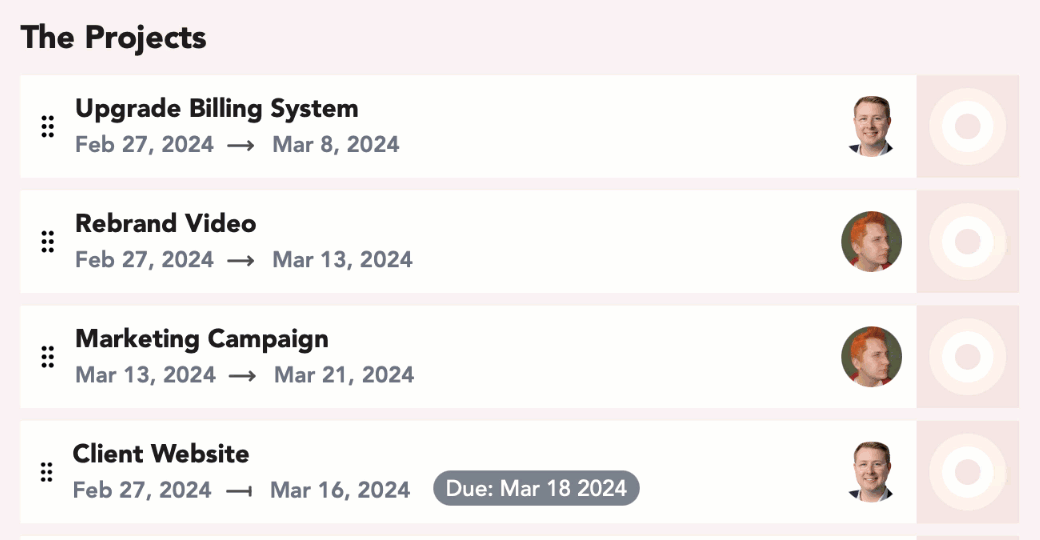
Progress tracking is similarly easy. And when a project status changes (or doesn't change!) Burndown will automatically update the schedule to match the current reality.
Burndown isn't just about efficiency in managing projects; it's designed to liberate your time. Automated scheduling, conflict resolution, and real-time adjustments save your hours of administrative burden every week.
Try Burndown and simplify your project management todayRescheduling Projects on Asana
Asana is a popular project management tool known for its ease of use and versatility. It provides features such as task lists, boards, calendars, and timelines to help teams organize and visualize their work. Asana can be particularly useful for teams focusing on collaborative task management.
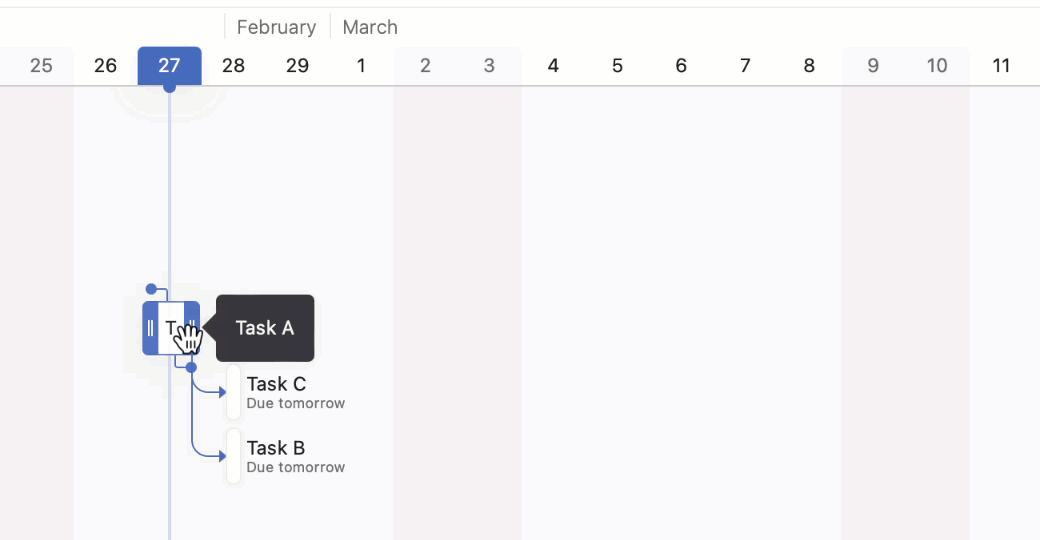
Asana automatically updates task schedules for tasks with dependencies. Meaning, if Task B can't start until Task A is finished, you can link them as a "dependency." This ensures that if Task A gets delayed, Task B's due date will automatically update.
However, Asana offers no automation for tasks without dependencies, which unfortunately, make up the bulk of projects for many teams. You cannot automatically reschedule tasks if there are no dependencies in place, and bulk rescheduling options are severely limited. Additionally, dependency-based rescheduling only works in Asana's timeline view, not the calendar or table views.
While you can select multiple tasks at once in Asana and assign them the same due date, this approach has a significant drawback – it won't respect relative spacing between tasks (and how often do you schedule all your tasks for the same due date?).
For updating projects in motion, Asana includes a Workload view that helps you monitor how much work is assigned to each team member and how much effort has been completed. However, this feature doesn't actually adjust your schedule and requires an Advanced Asana plan or above.
Overall, if your project has a significant change in due date or scope, you'll probably be disappointed with how much manual work it takes to get your Asana schedule back on track.
Automatically reschedule all projects with BurndownRescheduling Projects on ClickUp
ClickUp prides itself as an all-in-one, endlessly customizable productivity platform. Its extensive array of features can be both attractive and overwhelming, depending on your needs. It might appeal to teams who are very process-focused and love to experiment with their workflows.
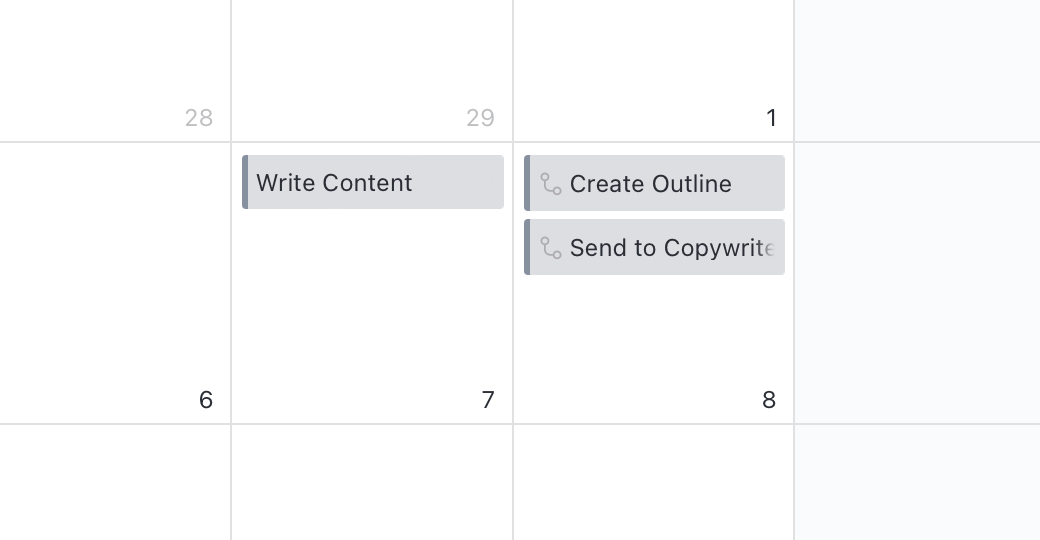
ClickUp does offer some limited capability for rescheduling subtasks when their parent tasks are modified. However, it’s crucial to note that this does not work consistently if you try to manipulate tasks by dragging and dropping them on the Gantt chart. And it doesn't update instantly, you have to refresh the screen to see the change.
For tasks linked via dependencies, ClickUp also adjusts dependent task dates when a prior task gets pushed back. However, it doesn't reschedule when a prior task is completed early, missing an opportunity to capitalize on project momentum.
ClickUp allows for time tracking as well as the ability to set estimates on tasks. Unfortunately, neither of these elements interact with the project schedule or impact due dates in any automated way.
While ClickUp seems to be moving in the right direction with subtasks and dependency-linked tasks rescheduling, it falls short as a holistic solution. If your projects require frequent timeline adjustments, plan to do a lot of manual work to update your schedule.
Seemlessly integrate project tracking and scheduling in BurndownRescheduling Projects on Monday.com
Monday.com is another widely-used project management platform. Its strength lies in its flexibility and range of customization options. Monday.com may be especially appealing to teams who enjoy adapting workflows to their unique processes and prefer a highly-visual interface.
Much like Asana, Monday.com can automatically shift due dates for tasks linked by dependencies, but only for those dependent tasks. And it's worth noting that dependencies are only available to users on the Pro plan and above.
For projects that don't heavily rely on dependencies, you can set up automations within Monday.com to partially address auto-updating dates. However, setting up automations that can accommodate all the nuances that impact project schedules is difficult and time-consuming.
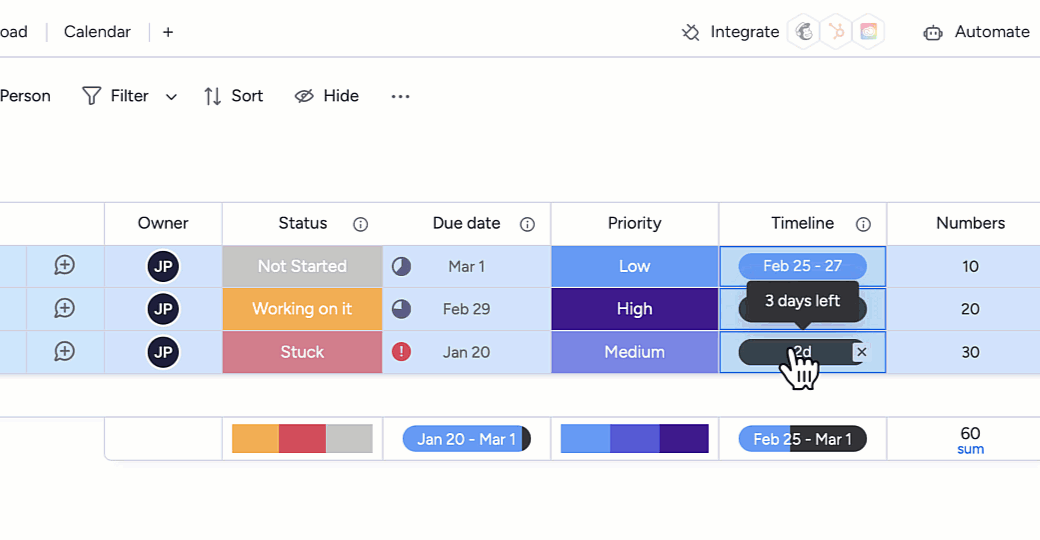
Monday.com does allow for spreadsheet-style bulk editing of projects, simplifying some of the processes involved in making project-wide changes. And this includes a "shift days" functionality which allows you shift multiple tasks by X number of days.
Various third-party integrations exist for Monday.com, and some specifically attempt to tackle the challenge of automatically adjusting due dates. However, it seems unlikely that off-the-shelf apps can be flexible enough to adapt to the wide range of situations most teams encounter.
Like Asana, Monday.com allows you to track task progress–but this tracking doesn't dynamically update your schedule. If progress is ahead or behind, you'll need to intervene manually.
Overall, if project scope or completion dates shift on your Monday.com project, you'll still likely end up doing a significant amount of manual updating to your schedule.
Everything's automatic with BurndownRescheduling Projects on Wrike
Wrike is a powerful project management tool that helps teams collaborate, streamline workflows, and deliver projects on time and within budget. Its customizable features, real-time updates, and integrations make it an ideal solution for businesses of all sizes.
Wrike boasts a feature designed to automatically address the problem of task rescheduling, a rarity in this space. If a team member's capacity changes, Wrike can make automatic schedule adjustments to maintain project flow as things change.
Although this capability seems promising on paper, it comes with a major caveat. Wrike has a habit of adjusting and extending deadline dates, even when you've set an earlier deadline that should not be moved. Also, visibility into these changes is murky, leaving you with an adjusted schedule but limited clarity about what was altered.
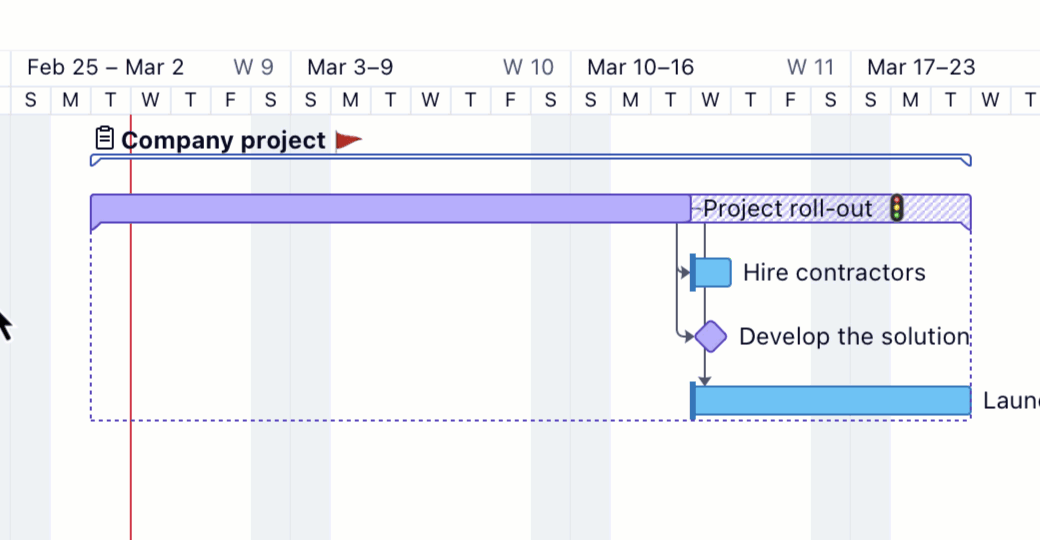
Wrike can also shift subtasks and dependent tasks to remain aligned with their parent tasks. Substasks are shifted from the table view though, and dependent tasks are only shifted from the gantt view (and only when you're holding the "shift" key).
Like Monday.com, Wrike allows bulk edits. Its table view lets you change project parameters for multiple tasks simultaneously, helping streamline some of the scheduling process.
Wrike supports several ways for teams to track work effort: time, percentage complete, and custom fields. Yet, none of these directly interact with the project schedule itself, and changes remain manual and time-consuming.
Wrike has a clear understanding of how important automated rescheduling is. For that, they deserve credit. But their implementation is likely to be difficult to use effectively and may obscure important information about your project's schedule.
Conflicts between the schedule and due date are big and red in Burndown.Rescheduling Projects on Basecamp
Basecamp takes a uniquely simple and streamlined approach to project management. While it could be a good fit for very small teams seeking a no-frills solution, it's likely to feel limiting for projects of even moderate complexity.
Basecamp does not offer any form of bulk editing. Every change to project schedules, task dates, assignees, or other properties must be painstakingly carried out one at a time. Those accustomed to the efficiency of spreadsheet-like interfaces will find this especially frustrating.
There is no functionality within Basecamp to automatically reschedule tasks or project elements. If a project's timeline changes, you are responsible for manually updating each impacted task.
Basecamp does feature "Hill Charts", which offer a unique way to visualize project progress. Unfortunately, these charts have no connection to the project timeline or due dates, so they won't relieve any burden in reworking your schedule.
When it comes to easily and efficiently updating project due dates in response to changes, Basecamp leaves much to be desired. Plan to commit significant manual effort every time your schedule needs adjusting.
Rescheduling Projects on Trello
Trello is known for its intuitive Kanban board interface and ease of use. Cards represent tasks that move through columns to represent different stages of work.
Start and end dates can be added to Trello cards and visualized on Calendar, Timeline, and Table views. However, these views are only available in Trello's Premium and above plans.
Trello lacks any automatic rescheduling functionality. It also doesn't offer bulk editing of due dates, except for a limited option within the Table view.
So unfortunately, if your projects involve frequent changes or adjustments, Trello will force you to manually update numerous task dates, making it a time-consuming and potentially error-prone experience.
Using Burndown alongside other tools
Burndown is unique in that it doesn't need to replace your existing project management tools. Instead, Burndown can can be used as a high-level companion for more detailed, task-oriented tools.
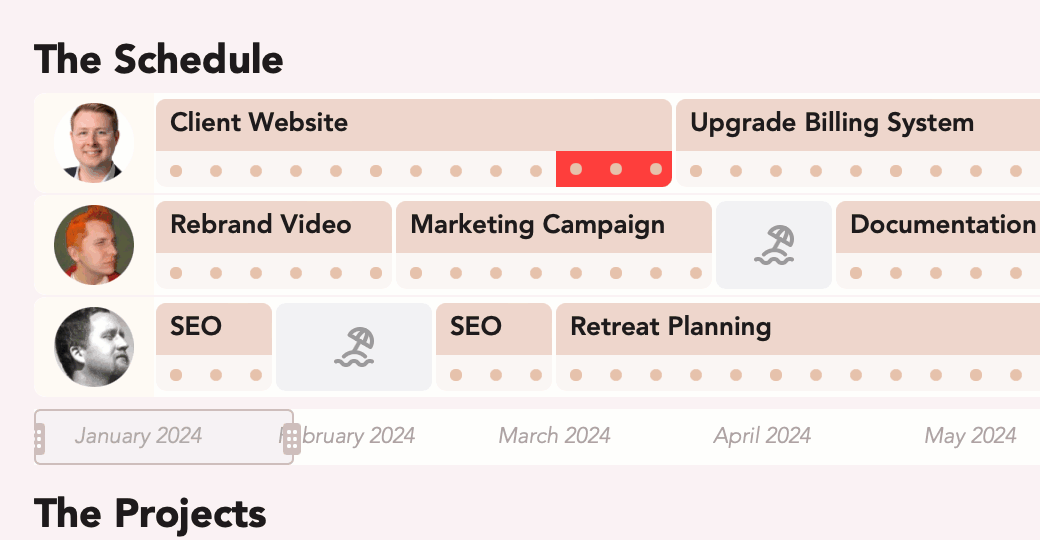
Burndown can save significant time and increase overall project management productivity. Teams won't be tied down by tedious schedule maintenance and can instead focus on execution and communication.
Even with the shortcomings we've explored, your favorite project management tool likely still offers strengths in various areas. The best approach may be a hybrid method, pairing tools for their strongest suits and relying on Burndown to fill a critical gap in keeping your projects on track.